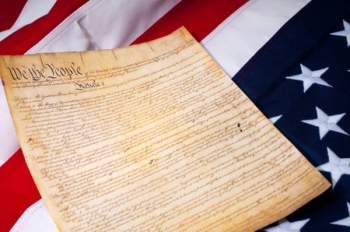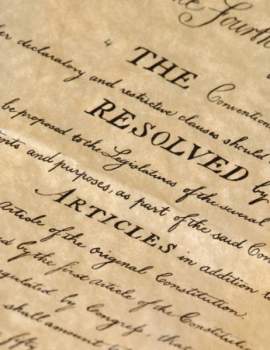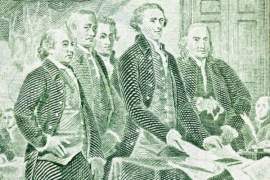
The Fourteenth Amendment

Popular In Constitution
Purpose Of Lifetime Appointment And Pros And Cons Enumerated Powers Bicameral Legislature Background Article 3 Of The Constitution We The People 1st Amendment Who Wrote The Constitution Judicial Review Equal Protection Clause 5th Amendment 10th Amendment Three Fifths Compromise
The Fourteenth Amendment was passed in July 1868 and is one of the so-called Reconstruction Amendments, also including the Thirteenth and Fifteenth, through which Congress enabled its program of rebuilding and reform directed toward the former Confederate states in the wake of the Civil War. A primary purpose of the Fourteenth Amendment was to Constitutionally establish the illegality of slavery, to which end it expanded the definition of citizenship. The Supreme Court decision in the case of Dred Scott v. Stanford, which prohibited citizenship for slaves or their descendants, was thus struck down.
The Fourteenth Amendment was also intended to guard against any future decision by the Supreme Court to strike down the Civil Rights Act of 1866, the previous Congressional measure for the expanded availability of citizenship.
The Fourteenth Amendment consists of five sections, the first being the most relevant to the interpretation of citizenship and rights issues by the Supreme Court. The language of this section provides the American legal system with the Citizenship Clause, the Due Process Clause, and the Equal Protection Clause. The first specifies as subjects for citizenship "all persons born or naturalized in the United States", the second to the inability of states to "make or enforce any law which shall abridge" citizens' rights without "due process", and the third to the inability of states to deny anyone "equal protection of the laws". Supreme Court decisions on purported violations of rights thus often draw on the Fourteenth Amendment.
During the early 20th Century, the Supreme Court chose to interpret the Due Process Clause, to the minds of some observers against its original purpose, as guarding against the ability to regulate private contracts, as in Lochner v. New York in 1905. The Lochner case disallowed limits on the hours which could be required of workers. This reading of the Due Process Clause subsided in the Depression Era of increased Government intervention in the economy. In the 1937 case of West Coast Hotel v. Parrish, the Court reversed its general view of the Due Process Clause as being applicable to employment contracts.
In interpreting the Fourteenth Amendment, the Supreme Court has repeatedly made use of the "Incorporation Doctrine". This principle holds that the First, Fourth, and Sixth Amendments are entirely, and the Fifth and Eighth Amendments are partly, incorporated by the Due Process Clause of the Fourteenth Amendment. The basic purpose of it is to require states to observe the rights granted by the Bill of Rights, which had been previously limited by the doctrine of states' rights.
The Supreme Court allowed for a wide interpretation of the Equal Protection Clause in the first decades following the Fourteenth Amendment's passage, but began to limit the provision's applicability with the 1896 decision in the case of Plessy v. Ferguson in favor of the "separate but equal" argument for allowing segregated facilities. The Court eventually reversed itself on this decision with its finding in the case Brown v. Board of Education, which provided the impetus for the Court's newly broadened applications of the protections toward various groups.


















